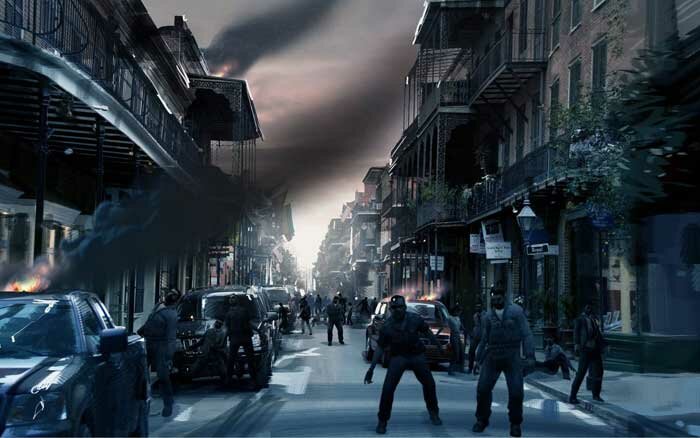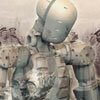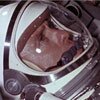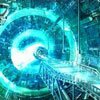
There he is--our president, the man who saved us from the zombies. Never changes a hair, does he? Interesting, that. They've done studies about it, you know, before-and-after shots of presidents. That kind of power consumes a man. Bill Clinton went completely gray by the time he was done. George W. kind of shriveled up. Nixon's jowls got--jowlier, I guess. And of course, poor LBJ. Do you remember LBJ? Probably not. Guy looked like he'd had the life sucked out of him. Good thing he didn't run for another term. He'd have died before it was over. They all got old before their time, except Reagan. Reagan, and now Drake.
Looks like he's taking questions this time. They'll be softballs--he's had the press in line for a long time now. Trust me, I know. I used to be one of them. Remember a show called The World in a Nutshell, back before the zombies came? Yeah, that was me--Richard Hale. I live here now, writing for the Clarion. Why'd I leave the big time? Well, it has to do with that man on the screen. If you've got the time, I'll buy the beer.
Let me tell you about the scaredest I've ever been.
*
It was a scary time in general, of course, had been ever since the first reports came out of California. Nobody knew what was going on. That's pretty scary in itself, especially if it's your job to know. So everybody took their best guess. You've got to tell people something. I mean, come on, imagine Katie Couric sitting there, saying, "Something's happening, but damned if we know what. We're clueless, folks. Now here's Al Roker to throw some darts at the weather map." How long would you keep watching?
And so it was a race riot (ABC). It was gang violence (CBS). It was a grassroots protest against cuts in social programs (NPR). Chris Matthews said it was the Tea Party. Bill O'Reilly said it was Occupy Wall Street. By the time we found out what was really going on, we'd all but lost the major cities.
*
The network got me embedded with an Army unit out of Fort Benning, headed north to reinforce Washington. I got to ride over the city with some guys doing aerial surveillance. It was a God's-eye view of hell--over a million people, or used-to-be people, wandering in aimless herds through the used-to-be capital of individuality, liberty, and enterprise.
The government was long gone. Congress had been in recess when things started. Most of them were back home, barricaded in like everyone else. The president was running things from Camp David. They'd moved the VP to a separate-but-undisclosed location, just like after 9/11. My guess was Cheyenne Mountain. Think about it. What are the zombies going to do, dig?
It was the second--no, wait--the third week we were there that the generals called a late-night press conference. I rode in a Jeep with our unit's CO, Colonel Waters, enjoying the illusion of a breeze in the ninety-degree heat. Never mind that the breeze stank of napalm, burning flesh, and decomp. You take what comforts you can get.
We had to hug the side of the street, as a huge convoy of troop carriers and recon vehicles passed us on the left. Instead of camouflage or pea-green, the vehicles were all in black. Everything, from the wheels to the canvas on the backs of the trucks. I turned to the colonel. "What's all that?"
"That's what this conference is about," came the reply.
"Special unit?"
"So they tell me."
"What branch?" I asked.
"Private contractors," said Waters. "Supposed to have some kind of special training."
I was incredulous. "We're bringing in mercenaries?"
He went upside my head with his eyes. "Contractors," he said, and turned to get out of the Jeep.
"What's the difference?" I asked him.
Waters stopped and glanced back at me. "Contractor's what you say when you need them."
Inside, a group of about six men in strange uniforms joined the familiar personnel. They wore no insignia, no decorations, nothing to indicate rank, or even identity. Their ski masks were pulled up, revealing pale and expressionless faces. The black uniforms covered every other inch of them. They looked more like movie terrorists than the good guys. Today, of course, everybody knows that uniform. It's been the biggest-selling Halloween costume for three years running.
General Davis, the chairman of the Joint Chiefs, opened the conference. "Ladies and gentlemen, I'd like to thank you all for coming out tonight. I'm sorry we weren't able to brief you at prime time, but we had orders to keep things quiet until our...guests could arrive. As you can see, they're only just getting here now.
"It's my honor to introduce Colonel Erasmus Drake, United States Army, Retired. Colonel Drake is president of the NightWatch security firm, based in Monterey, California. The NightWatch has developed new methods of zombie warfare, which we hope will put an end to the current crisis. By order of the President, Washington will now be the colonel's proving ground. Our regular forces will serve in a support capacity. I'll let the colonel tell you more about it." The general gestured toward the group of men in black. "Ladies and gentlemen, Colonel Drake."
That was the first time I saw him, a handsome man in his middle years, the same as he looks now. The shoulder-length hair and rakish goatee seemed out of place on a military man, but he carried himself like a West Pointer. He stepped to the podium and looked us over with a quiet, gentle smile.
"Good evening, ladies and gentlemen," he said in that deep, musical voice of his. I couldn't place his accent--some blend of Southern drawl and British highbrow.
"As the general told you, I am president of NightWatch. In addition to private security details, our contractors have served on behalf of the United States in a number of operations that would have been impractical or undesirable for regular troops." He smiled again. "I'd tell you what they were, but we need to save our ammunition for the enemy."
It was a weak joke, but we all laughed--it broke the tension.
"In the course of one of these operations," the colonel continued, "we found evidence that some of our country's enemies were developing a new form of bio-terror. A form whose nature--if I may call it nature--was unparalleled in the annals of guilty Man. Naturally, we reported our findings to the Pentagon, but nobody found it credible.
"NightWatch has spent the past ten years developing plans, materiel, and training for what the movies call a 'zombie apocalypse.' Tonight, we mean to test them on a large scale. Each night's foray will consist of a three-stage operation:
"First, with the help of regular troops, we will lure a number of zombies to a designated kill zone.
"Second, we will surround said zombies and...dispatch them.
"Third, we will burn the bodies to prevent the spread of infection--natural or otherwise.
"At the same time, we will endeavor to locate survivors and rescue the uninfected, if any. We will repeat this operation each night until the threat is effectively neutralized. We estimate that Washington will be open for business again in about a month."
The colonel paused and looked us over once again. "Ladies and gentlemen, the fight back has begun! Any questions?"
Lots of them, I thought. It all sounded too easy.
"Colonel, you seem very confident," I said. "What new weapons or tactics have you developed, and how will they succeed where previous attempts have failed?"
"We haven't so much developed a new weapon," the colonel replied, "as improved a little on an old one." He turned to one of his aides. "Captain?"
One of the staff drew a sword from behind his back and handed it over.
"We use police batons as a backup," Drake continued, "but this is our weapon of choice. I'll pass it around, so you all can examine it up close. But do be careful--it's very sharp. We've based the design on the medieval broadsword. I know Japanese weapons are all the rage in films, but they just don't pack the necessary force. The blade is a steel-titanium alloy, on which NightWatch holds the patent. It's extremely durable and holds an edge better than anything commercially available. The swords are calibrated for balance, but we left them heavy to ensure penetration. We mean to crack skulls--literally."
There was another round of laughter.
"We also carry sidearms," said the colonel, "but we don't expect to do much shooting. The most effective way to kill zombies is in melee combat."
The sword came around to me. It was entirely black, with the edge of a razor and the heft of a crowbar.
"Colonel," asked Dick Jarvis of the Post, "wouldn't you be overwhelmed by the sheer force of numbers?"
"Excellent question!" said Drake. "This is where the hi-tech aspect really comes in. Allow me to demonstrate." He turned to his staff again. "Major Seward, would you please turn on the camera?"
The colonel waved Jarvis forward. "If you'd just step over here, sir, and face the TV screen?"
The monitor showed a large, irregular shape in a kind of purplish red against a black-and-white background. A single red silhouette broke off and grew brighter.
"This is a standard infrared camera," the colonel explained. "You can see there yourselves and Mister--Jarvis, is it? What you're looking at are heat signatures."
Pete Hardy, my cameraman, leaned over and whispered in my ear. "Got to get me one of those!"
One of Drake's staff--the one whose sword we'd examined--stole behind Jarvis. The monitor showed nothing.
"You may have noticed that our uniforms are a bit unusual," the colonel said. "They're designed to dampen heat, and even body odors, as well as being light-absorbent. We don't know much about how zombies' senses work yet, but our uniforms ought to make us all but undetectable."
The aide caught Jarvis by the shoulder, his other hand bringing a nightstick up under his neck. Jarvis screamed. The rest of us laughed, then applauded. The officer took off his ski mask and gave us a mischievous smile.
"And of course," the colonel said, "they're also bite-proof. Thank you, Captain Morris."
*
I got an exclusive that night. You probably saw at least some of the footage. If you buy the commemorative Blu-Ray, they've got the whole thing in the special features.
Pete and I rode in a half-track with Lieutenant Ed Pegg's platoon. We were the colonel's "bait." The troops fired into the air and cranked up the metal full-blast. I was never much for Iron Maiden, but when the world around you looks like one of their album covers, it does kind of fit. The dead came from everywhere. We kept moving, slow enough to let them keep up, but too fast to catch us.
We ended up driving single-file into a blind alley flanked with a 'Dead End' sign. That earned a few laughs. One of Drake's men backed a bulldozer in behind us.
The alley ended in a brick wall. The colonel himself was there to meet us. "I trust you all made it in safely, gentlemen?" He glanced behind us. "And I see you brought our guests of honor. Feel free to whoop and holler to your hearts' delight. We want to make this a standing-room-only affair. But do refrain from firing any live rounds unless they somehow get past us. The things that might result from an open wound out here don't bear much thought."
The zombies crowded into the alleyway. The first of them were fifty yards from us. Then forty.
Then thirty.
The sweat was soaking through my blazer.
The colonel looked at his watch, while his other hand pointed skyward. "Prepare to cut your lights, gentlemen," he said.
"And--now!"
Dull, flapping sounds came from the left and right. I thought of bats swarming out of a cave. My night goggles showed ropes being dropped from the surrounding buildings. Drake's men rappelled down, one after another, so fast we never even got it on tape--Pete was still switching over for night vision.
The NightWatch troops formed a V with their backs to us. Drake raised his sword. It whistled as he brought it down.
"Charge!"
Drake's men tore into the zombies with the speed of revolving blades, cutting off heads and caving in skulls. For two hours, the zombies lurched forward, and the colonel's troops pushed them back. How do they keep up that pace? I wondered.
Finally the line reached the mouth of the alley. The ground was piled with bodies--a chest-high carrion snowdrift. The soldier who'd brought in the dozer got back in the driver's seat, pushing them into the street, while some of his comrades pitched in by hand.
Colonel Drake came over. "Lieutenant, you've all done an excellent job tonight. We're ahead of schedule. I want to get one more round in before morning."
*
Drake's men reported killing over twenty-five thousand zombies that first night. The Army brass didn't believe it until I showed them our footage. They started earlier the next night and took out fifty thousand more. It seemed incredible. No wonder they had to sleep all day to recover.
I wasn't with them that night. They used troops from a different regiment--MSNBC had their guys embedded--but from what I heard, it was the same story.
As for me, I'd become the network's golden boy. They sent Geoff Daniels out to produce my reports on-site--his first time in the field since 9/11. With him came a memo, informing me of a $5K raise, retroactive to the first of the year.
It was Geoff who suggested getting the aerial coverage on nights when we weren't with the troops. He put us on a Sikorsky Blackhawk with one of the recon teams.
The zombies now came in trickles instead of waves. Aerial reconnaissance looked for concentrations and fed the coordinates to NightWatch. It took us twenty minutes to find a concentration big enough to radio in. Pete got footage of all and sundry. This was what our viewers wanted, needed to see--evidence of hope.
We found half a dozen 'hot spots,' then swept back through to watch the NightWatch troops at work. Their formations weren't as tight, now. They improvised, using their guns to pick off individual zombies when they couldn't corral them into groups. They sent squads into the buildings, too. I could only imagine what they found.
"Looks like they've flushed a few out," one of the recon team said.
A group of figures came out of a doorway, stumbling, gazing around. Something about them seemed wrong. I didn't know what until they started running.
"Survivors!" I said. "Follow them! Pete, are you getting this?"
"Hell, yeah!" he said.
I counted five of them. One was a woman cradling a small child in her arms--I think it was a little boy. They'd started running when they saw Drake's contractors tearing apart a small group of zombies. I couldn't blame them. It wasn't pretty. I figured they were probably in shock. Some of the NightWatch troops ran after them.
One of the survivors tripped, as the others turned into an alleyway. A group of contractors dove on him. All I could think of was a football pile-up. "That's a little excessive," I mused. The NightWatch guys got up again. The survivor didn't. No one stayed with him, either--they all ran after the others.
I felt a chill. "What the shit?" I asked.
"Got me," said the pilot. "Let's see where they're going."
The remaining survivors cowered against a brick wall at the back of the alley. One of them waved something at the NightWatch troops.
"What is that?" I wondered aloud. "One of their swords? Looks like he's got it by the blade. Is he threatening to kill himself?"
"It's not a sword," Pete said. "Look how he's moving with it."
"What do you mean?" I asked. "He's just waving it up and down, side-to-side."
"Ever know any Catholics?" he said. Before I could ask what that had to do with anything, he said, "Oh, shit--here they come!"
Three of Drake's men rappelled down behind the survivors. The man turned around as they fell on him. It was over in thirty seconds. We followed them as they carried the bodies back and threw them on the fire with the zombies.
I leaned out of the helicopter and puked. The chopper crew hauled me back in and shut the door. We'd been ordered back to base.
*
The Blackhawk's crew and our own team headed off to separate "de-briefings." Ours amounted to search, seizure, and censorship. When Waters handed me the non-disclosure forms, I almost asked him if he wanted then signed in blood. There was plenty coming out my ass.
*
Geoff was livid when we got back to our makeshift room. He was on the phone to Atlanta before he'd heard half the story. "No way we let them pull this shit," he said. "We're still in contact with a senator or two, plus some White House sources who've stayed with the president. I'm going over there now and tell the colonel what trees make shingles."
"Good luck with that," I told the closing door, and helped myself to Geoff's Scotch.
I was into my third when my cell went off. It was Pete. "Meet me in the network van. I've got something to show you. Bring Geoff."
"Can't," I said. "He's at HQ, reading Waters the riot act." If they even let him in, I thought.
"I'll text him," Pete said. You get down here anyway. You're not going to believe this."
*
Pete was already in the van when I got there, seated at the control board. He had a big black cross on his T-shirt--looked like he'd drawn it on with a Sharpie.
"Did I miss the altar call?" I asked.
"Have a look at this," he said, nodding toward the monitor screen.
It was the infrared footage from Drake's first press conference.
"Remember how hot I was on that infrared camera? I copped the tape when no one was looking. Check it."
He cued up to the point where Drake's captain made his mock attack on Dick Jarvis. "Watch what happens when the guy takes off the mask."
I shook my head. "I didn't see anything happen."
"Exactly," said Pete. "The uniform's supposed to dampen body heat, right? The minute he takes that thing off, his face should light up on the monitor. But there's nothing. No wonder they need someone else to draw the zombies out."
A noise came from the van's back door. Pete stood up and grabbed a tent-peg. He held it like a knife motioning me to stand still. He cracked the door. "Come on in, Geoff." he said.
Daniels climbed in slowly. He looked like he'd been through the wringer. I chalked it up to Waters' song and dance.
"What do you mean, 'no wonder?'" I said.
"I mean, zombies only attack the living."
Daniels caught him by the shoulders. He got out a, "What the--" before Geoff bit into him.
I tripped getting out of my swivel chair and landed on my ass. I crawled backward till I was up against the mesh behind the driver's seat. The only way out was over one dead friend who was killing another. I was estimating my chances of slipping past them, when Geoff's head split down the middle.
By the time my eyes caught up with the blade, Drake was putting it back in its sheath. He stepped up into the van. "Cover your ears, Mr. Hale." I did. Closed my eyes, too, when I saw him reach for his pistol.
When I opened them, Drake stood in front of me, arms crossed. "I'm terribly sorry about your colleagues," he said. "I hate having to do that. You know what they say about loose lips."
He smiled at me then, a wide, open-mouthed smile, nothing like the one he shows in public.
That was it. The moment he smiled. That was the scaredest I've ever been in my life.
Jesus, those teeth...
*
You know the rest. Drake cleaned up the zombie menace in nine months. The next year, a grateful country made him president. Nobody asked why he campaigned only at night. I sure as hell didn't. In fact, I didn't report on it at all.
I told the network I needed a leave of absence. I got a friendly shrink to diagnose me with PTSD. I only stopped into the office once, to pick up a few things. I've got a couple of them here.
This one's from the Library of Congress. Remember that 1870s picture someone found a while back, that looked like Nicholas Cage? This one's something like that. Here, see? It's a group of Confederate soldiers, Taylor's Louisiana brigade. See this fellow with the captain's bars? Look familiar? On the back it lists him as E.V. Drake. I know, probably coincidence. Maybe an ancestor.
This other thing's a clipping from the LA Times. The night before the first zombie attacks were reported, an alarm went off at a warehouse in South Central. No details as to what was stolen. The building belonged to a biotech firm called Eugenomics. They're part of a holding company called the Vespera group. I did some research. Turns out NightWatch is part of Vespera, too. Vespera's CEO? You guessed it. E.V. Drake.
Interesting, isn't it? It explains a few things. Like the ban on religious displays--some people find crosses offensive. Likewise the wars on tobacco and trans-fats. This government has a keen interest in keeping us healthy.
Not that anybody would believe any of this, of course. They'd think you're crazy--or a drunk.
Like me--a crazy old drunk. You, too. Have another. On me. After all, sooner or later--ha-ha!--we're all going to get drunk!
Better than getting eaten, I suppose.
*
More in Science Fiction / Fantasy...

by Thomas A. Mays
Non-Traditional Holiday Contest Grand Prize Winner

by Leigh Kimmel
An astronaut clone gets into a heated online debate.

by Kelly Parks
Alternate universe meets bad boss.

Kevin J. Bartell lives in the Finger Lakes District of Upstate New York. His work has appeared in Encounters Magazine and the anthology, Revelation: Conquest.
No reviews found.